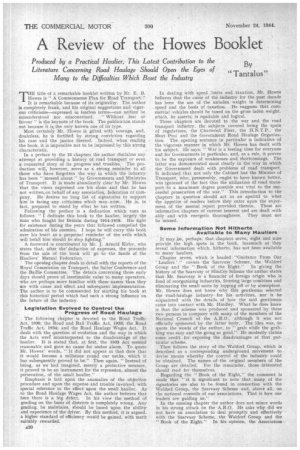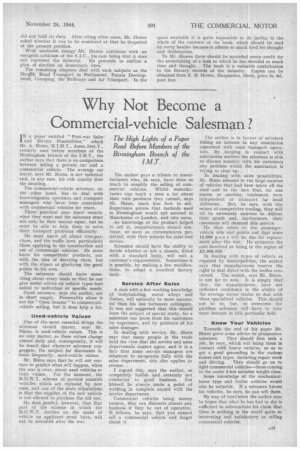A Review of the Howes Booklet T HE title of a
Page 22

Page 25

If you've noticed an error in this article please click here to report it so we can fix it.
remarkable booklet written by Mr. E. B. Howes is " A Commonsense Plan for Road Transport." It is remarkable because of its originality. The author is completely frank, and his original suggestions and vigorous criticisms—expressed in fearless terms—can neither be
misunderstood nor misconstrued, " Without fear or favour " is the keynote of the book. The publication stands out because it is, the only known one of its type. Most certainly Mr. Howes is gifted with courage, and, doubtless, he is fortified by strong conviction regarding his case and the justice thereof. Indeed, when reading the book, it is impossible not to be impressed by this strong characteristic.
In a preface to the 16 chapters the author disclaims any attempt at providing a history of road transport or evert a connected story of its progress and troubles. The production will, however, serve as a strong reminder to all those who have forgotten the way in which the 'industry has been "messed about " by Governments and Ministries of Transport. It is made abundantly clear by Mr. Howes that the views expressed are his alone and that he has not written,on behalf of any association, federation or company, He desires no long list of signatories to support him in. facing any criticisms which may arise. He is, in fact, prepared to stand by what he has written.
Following the preface is a dedication which runs as follows: " I dedicate this book to the haulier, largely the man who fought for Britain during 1914-1918. His fight for existence during the years that followed compelled the admiration of his enemies. I hope he will carry this book over his heart as a perpetual reminder of the evils which will befall him should he stop fighting."
A foreword is contributed by Mr. J. Arnold Kirby, who states that, after the' deduction of expenses, the proceeds from the sale of the book will go to the funds of the Hauliers' Mutual Federation.
The opening chapter deals in detail with the reports of the Royal Commission on Transport, the Salter' Conference and the Committee, The details concerning those early days should prove of inestimable value to many operators, who are perhaps more familiar with these names than. they are with cause and effect and subsequent implementation. The author is to be commended for starting his book at this historical period which had such a strong influence on the future of the industry.
Legislation Evolved to Control the Progress of Road Haulage
The following chapter is devoted to the Road Traffic Act, 1930; the Road and Rail Traffic Act, 1933; the Road Traffic Act, 1934; and the Road Haulage Wages Act. It deals with the question of evolution and the way in which the Acts were misinterpreted to the disadvantage of the haulier. It is stated that, at first, the 1933 Act seemed reasonable and gave no cause for undue alarm. To quote Mr. Howes' words, " It did not appear at that date that it would become a millstone round our necks, which it has subsequently proved to be." Then again, " Instead of being, as we had imagined, merely a protective measure, it proved to be an instrument for the repression, almost the persecution, of the small haulier."
Emphasis is laid upon the anomalies of the objection procedure and upon the expense and trouble involved, with special reference to the effect upon the small haulier. As to the Road Haulage Wages Act, the author believes that here there is a big defect. In his view the method of grading on the basis of districts is completely wrong. Any grading, he maintains, should be based upon the ability and experience of the driver. By this method, it is argued, a higher standard of efficiency would be gained, with merit suitably rewarded.
In dealing with speed limits and taxation, Mr. Howes believes that the curse of the industry for the past decade has been the use of the unladenweight in determining speed and the basis of taxation. He suggests that commercial vehicles should be taxed on the gross laden weight, which, he asserts, is equitable and logical.
Three chapters are devoted to the war and the road transport industry, the subjects covered being the spate of regulations, the Chartered Fleet, the H.N.T.P„ the Meat Pool and the Government Road Haulage Organization. The opening sentence in particular is indicative of the 'vigorous manner in which Mr. Howes has dealt with his subject. He says: " War is a testing time for everyone and for Governments in particular, and, as a rule, it proves to be the exposure of weaknesses and shortcomings, The latter was demonstrated most clearly in the way in which the Government dealt with problems of road transport. It indicated that not only the Cabinet but the Minister of Transport, who, Presumably, ought to have known better, was ignorant of the fact that the utilization of road transport to a maximum degree possible was vital to the suecessful prosecution of the war." This introduction to the chapters in question should act as an aperitif to whet the appetite of readers before they enter upon the enjoyment of the • mental repast provided therein.. These are informative chapters of current interest and are dealt with ably and with energetic thoroughness. They must not be missed.
Some information Not Hitherto Available to Many Hauliers It may be, perhaps, that chapters seven, eight and nine provide the high spots in the book, inasmuch as they reveal information which, hitherto, has not been available to many hauliers. Chapter seven, which is headed "Guidance From Our Leaders ' " covers the Szarvasy Scheme, the Waldorf Group and the " Book of the Eight." In giving the history of the Szarvasy or Hindley Scheme the author states that Mr. Szarvasy is a financier of foreign origin who is fond of reorganizing industries, forming large combines and eliminating the small units by lopping off or by absorption, Mr. Howes does not know why this gentleman selected the road-haulage industry for his activities, nor is he acquainted with the details of how the said gentleman came into contact with Mr. Hindley, What he does know is that the scheme was produced and sponsored by these two persons in company with many of the members of the National Council of the A.R.O., although it was not officially sponsored by the latter body. The idea was, to quote the words of the author, to " grab while the grabbing was easy and the going so good." .He modestly claims some credit for exposing the disadvantages of that particular scheme.
Then follows the story of the Waldorf Group, which is described as a corresponding underground Movement to devise means whereby the control of the industry could he obtained. The names of the original members of the Group are detailed. For the remainder, those interested should read for themselves.
Regarding the "Book, of the Eight,"• the comment is made that "it is significant to note that many of the signatories are also to be found in connection with the Waldorf Group, the Szarvasy Scheme and, above all, on the national councils of our associations. That is how our leaders are guiding us."
In the ensuing chapter the author does not mince words in his strong attack on the A.R.°, He asks why did we not have an association to deal promptly and effectively ' with the Szarvasy Scheme, the Waldorf Group and the " Book of the Eight." In his opinion, the Association did not fulfil its duty. After citing other cases, Mr. Howes asked whether it was to be wondered at that he despaired of the present position.
With unabated energy Mr. IIowes continues with an energetic criticism of the S.J.C., his case being that it does not represent the industry. He proceeds to outline a plan of election on democratic lines.
The remaining chapters deal with such subjects as the Merier, Road Transport in Parliament, Future Development, Grouping, the Railways and Air Transport. In the space available it is quite impossible to do justice to the whole of the contents of the book, which should be read by every haulier because it affords so much food for thought and deliberation.
To Mr. Howes there should he accorded every credit for the undertaking of a task to which he has devoted so much time and thought. The book is a valuable contribution to the literary records of the industry. Copies can be obtained from E. B. Howes, Harpenden. Hertz, price 2s. 6d. post free




















































